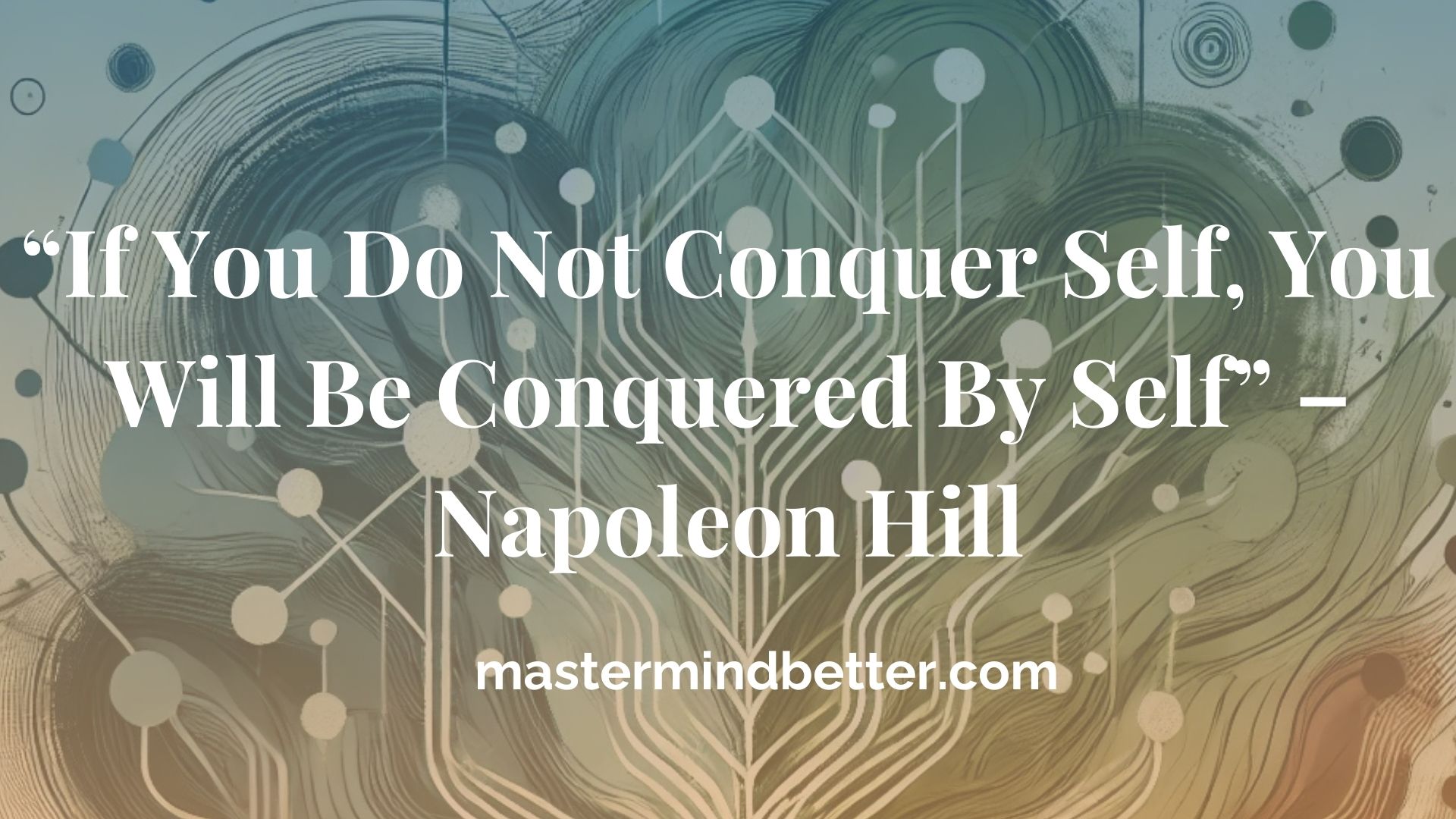Table Of Contents:
- Key Takeaways
- Understanding Self-Conquest: The Journey Within
- The Role of Mindset in Personal Growth
- Identifying Limiting Beliefs: Obstacles to Self-Mastery
- Strategies for Developing a Growth Mindset
- Practical Steps to Overcome Self-Doubt
- Building Resilience Through Mindful Practices
- Committing to Continuous Growth: A Lifelong Journey
- Frequently Asked Questions
- Conclusion
What’s holding you back from reaching your full potential? Many people struggle with self-doubt and limiting beliefs, hindering their personal growth. This article explores the power of mindset in conquering yourself and achieving your goals. Drawing from Carol Dweck’s research, we’ll discuss strategies for developing a growth mindset, overcoming self-doubt, and building resilience. By the end, you’ll have practical tools to boost your productivity and embark on a journey of continuous self-improvement.
Key Takeaways
- Self-awareness forms the foundation for personal growth and overcoming limitations
- Developing a growth mindset enhances resilience and adaptability in the face of challenges
- Challenging limiting beliefs and replacing them with empowering ones fosters personal development
- Practicing self-compassion and surrounding oneself with support helps overcome self-doubt
- Committing to continuous learning and adapting to change are essential for long-term growth
Understanding Self-Conquest: The Journey Within

Self-conquest is a transformative journey of personal development that begins with self-awareness. This section explores the distinction between self-control and self-conquest, highlighting the benefits of mastering one’s inner world. It also addresses common barriers to overcoming personal limitations, emphasizing the role of attention and therapy in self-improvement and overall health.
Recognizing the Importance of Self-Awareness
Self-awareness forms the foundation of self-conquest, enabling individuals to understand their thoughts, emotions, and behaviors. This understanding is crucial for mental health and self improvement, as it allows people to identify areas for improvement and develop strategies to overcome challenges. By cultivating self-awareness, individuals can enhance their intelligence and resilience in the face of failure.
Psychiatry emphasizes the importance of self-awareness in maintaining a healthy mind and fostering personal development. Through introspection and self-reflection, individuals gain insights into their motivations, strengths, and weaknesses. This knowledge empowers them to make conscious choices and take control of their lives, leading to greater success and fulfillment and self improvement
The Difference Between Self-Control and Self-Conquest
Self-control and self-conquest differ in their approach to personal growth. While self-control focuses on restraining impulses and managing behavior, self-conquest involves a deeper transformation of one’s mindset and beliefs. Self-conquest requires individuals to engage in learning, reflection, and consistent practice through exercises like meditation to overcome ingrained habits and addictions.
The journey of self-conquest demands a commitment to personal development that goes beyond mere willpower. It involves challenging limiting beliefs, embracing new perspectives, and cultivating a growth mindset. Through this process, individuals can achieve lasting change and develop the resilience necessary to overcome obstacles, ultimately leading to greater personal fulfillment and success.
Benefits of Mastering Your Inner World
Mastering one’s inner world yields profound benefits for personal growth and well-being. Individuals who develop self-awareness and emotional intelligence experience increased confidence and motivation, leading to improved decision-making and goal achievement. This inner mastery also enhances brain function, promoting cognitive flexibility and resilience in the face of challenges.
The journey of self-conquest cultivates positive habits and mindsets that contribute to long-term happiness and fulfillment. By understanding and managing their thoughts and emotions, individuals can break free from limiting beliefs and negative patterns, creating a foundation for sustained personal and professional success. The benefits of mastering one’s inner world include:
- Enhanced self-awareness and emotional regulation
- Improved decision-making and problem-solving skills
- Increased resilience and adaptability
- Greater sense of purpose and life satisfaction
- Stronger relationships and communication skills
Common Barriers to Overcoming Personal Limitations
Overcoming personal limitations often requires access to accurate information and constructive feedback. Without proper education and guidance, individuals may struggle to identify their areas for growth or develop effective strategies for change. Fear of failure or judgment can also hinder progress, causing people to avoid challenges that could lead to personal development. Understanding the power of collective growth and unified purpose can be a game-changer in this regard.
Ingrained patterns of behavior and thought can create significant barriers to self-conquest. These habitual responses, often developed over years, can be difficult to recognize and even harder to change. By cultivating self-awareness and embracing a growth mindset, individuals can begin to identify and address these obstacles, paving the way for meaningful personal transformation.
The journey within reveals our true potential. Our mindset shapes this path, determining how far we can go.
The Role of Mindset in Personal Growth

Mindset plays a crucial role in personal growth, shaping how individuals approach challenges and develop skills. This section explores fixed versus growth mindsets, their influence on behavior and outcomes, the science of neuroplasticity, and techniques for cultivating a positive, adaptive mindset. Understanding these psychological concepts can help reduce stress and manage emotions more effectively, leading to improved personal and professional outcomes.
Fixed vs. Growth Mindset Explained
Fixed and growth mindsets represent two contrasting approaches to personal development and learning. Individuals with a fixed mindset believe their abilities are static, while those with a growth mindset view challenges as opportunities for improvement. This mindset distinction significantly impacts leadership styles, language use, and the pursuit of knowledge.
Research shows that adopting a growth mindset can lead to better sleep quality and overall well-being. By embracing the idea that skills can be developed through effort and persistence, individuals are more likely to engage with challenging books, seek out new experiences, and cultivate a lifelong love of learning. This approach fosters resilience and adaptability, crucial traits for personal and professional success.
How Mindset Influences Behavior and Outcomes
Mindset profoundly shapes behavior and outcomes, as demonstrated by extensive research in psychology and education. Teachers and psychologists have observed that students with a growth mindset tend to embrace challenges, persist in the face of setbacks, and view effort as a path to mastery. This positive approach to learning creates a ripple effect, influencing not only academic performance but also personal relationships and overall well-being.
The impact of mindset extends beyond the classroom, affecting individuals’ experiences in their communities and professional lives. Those who cultivate a growth mindset often exhibit greater resilience, adaptability, and openness to feedback. By using tools like meditation apps such as Headspace, individuals can develop a more positive mindset, leading to improved mental health and enhanced problem-solving skills. The benefits of adopting a growth mindset include:
- Increased motivation and persistence
- Enhanced creativity and innovation
- Improved relationships and communication
- Greater resilience in the face of challenges
- Higher levels of achievement and success
The Science Behind Mindset and Neuroplasticity
Neuroplasticity, the brain’s ability to form new neural connections, underpins the concept of mindset and its impact on personal growth. Research shows that developing a growth mindset can lead to physical changes in the brain, enhancing cognitive function and improving quality of life. This scientific understanding reinforces the idea that individuals can cultivate their abilities and intelligence through effort and persistence.
Studies in neuroscience reveal that adopting a growth mindset activates regions of the brain associated with learning and empathy. This activation strengthens neural pathways, making it easier for individuals to embrace challenges and maintain their desire for self-improvement. As a result, those who cultivate a growth mindset often experience greater resilience and adaptability in the face of obstacles, leading to enhanced personal and professional outcomes.
Cultivating a Positive and Adaptive Mindset
Cultivating a positive and adaptive mindset involves implementing strategies that promote resilience and personal growth. Research from Stanford University suggests that practicing gratitude and reframing negative experiences can significantly reduce anxiety and improve overall well-being. These techniques help individuals develop a more flexible approach to challenges, enhancing their ability to navigate life’s ups and downs.
Incorporating mindset practices into daily routines can lead to lasting changes in mental health and physical well-being. For example, nursing professionals who adopt a growth mindset often report lower stress levels and improved job satisfaction. Similarly, individuals who approach their diet with a positive mindset tend to make healthier choices and maintain long-term lifestyle changes. To cultivate a positive and adaptive mindset, consider the following strategies:
- Practice daily gratitude exercises
- Challenge negative self-talk
- Set realistic goals and celebrate small wins
- Embrace failures as learning opportunities
- Seek out new experiences and challenges
Mindset shapes our path. But hidden barriers often lurk beneath the surface.
Identifying Limiting Beliefs: Obstacles to Self-Mastery

Identifying limiting beliefs is crucial for self-mastery and personal growth. This section explores how negative self-talk, past experiences, and mental states impact beliefs. It examines techniques from cognitive behavioral therapy to challenge limiting thoughts and replace them with empowering ones. Understanding these concepts can foster development and improve overall well-being, as highlighted by research from the American Academy of Arts and Sciences and books like “Why We Sleep”.
Unveiling Hidden Negative Self-Talk
Hidden negative self-talk often lurks beneath the surface, shaping an individual’s beliefs and actions without their conscious awareness. Professors of psychology and authors of influential works like “The 7 Habits of Highly Effective People” emphasize the importance of recognizing these internal dialogues. By uncovering these hidden thought patterns, individuals can begin to challenge and reshape their limiting beliefs, paving the way for personal growth and increased creativity.
Identifying negative self-talk requires a commitment to self-reflection and mindfulness. Artists and cultural innovators often demonstrate the power of reframing negative thoughts into positive, actionable ideas. This process not only enhances creativity but also builds resilience and fosters a growth mindset. By actively engaging with their inner dialogue, individuals can cultivate a more empowering narrative that supports their personal and professional development.
Impact of Past Experiences on Present Beliefs
Past experiences significantly shape an individual’s present beliefs, often creating mental barriers that hinder personal growth. Research in philosophy and psychology demonstrates how early life events and interactions form the foundation of one’s worldview, influencing future decisions and behaviors. Stephen Covey, renowned author of “The 7 Habits of Highly Effective People,” emphasizes the importance of recognizing these ingrained beliefs to foster self-awareness and facilitate positive change.
Overcoming limiting beliefs rooted in past experiences requires discipline and a willingness to challenge long-held assumptions. By viewing self-reflection as a gift rather than a burden, individuals can uncover the origins of their beliefs and work towards reshaping them. This process of self-discovery and conscious belief modification aligns with recent research on neuroplasticity, suggesting that with consistent effort, people can rewire their thought patterns and overcome obstacles to personal growth.
Techniques for Challenging Limiting Thoughts
Challenging limiting thoughts involves techniques rooted in positive psychology and moral character development. Ralph Waldo Emerson’s philosophy of self-reliance aligns with modern approaches to overcoming self-imposed barriers. By setting specific, achievable goals and practicing self-reflection, individuals can identify and question the validity of their limiting beliefs.
The New York Times has reported on the effectiveness of cognitive restructuring in combating negative thought patterns. This technique, often used in therapy, encourages individuals to examine evidence for and against their limiting beliefs. By systematically analyzing these thoughts, people can develop a more balanced and realistic perspective, fostering personal growth and resilience:
Replacing Limiting Beliefs With Empowering Ones
Replacing limiting beliefs with empowering ones requires developing emotional intelligence and shifting one’s perception. Individuals who cultivate grit and wisdom often find it easier to challenge negative thought patterns and replace them with positive, action-oriented beliefs. This process involves recognizing how one’s mood influences their thinking and actively working to reframe situations in a more constructive light.
Research shows that individuals who successfully replace limiting beliefs experience improved self-esteem and increased resilience. By focusing on personal strengths and past successes, people can build a foundation of empowering beliefs that support their growth and development. This shift in mindset often leads to enhanced problem-solving skills and greater overall life satisfaction:
Limiting beliefs hold us back. Yet, with the right strategies, we can cultivate a growth mindset and break free.
Strategies for Developing a Growth Mindset

Developing a growth mindset is essential for mastering self-conquest. This section explores strategies to view challenges as opportunities, learn from feedback, persist through setbacks, and celebrate effort. These approaches, rooted in insights from entrepreneurship and college experiences, help individuals cultivate resilience and adaptability. By embracing these strategies, one can gain valuable insights and develop a temperament conducive to personal growth.
Viewing Challenges as Opportunities
Viewing challenges as opportunities is a key strategy in developing a growth mindset. Individuals who approach obstacles as puzzles to be solved rather than insurmountable barriers often experience greater success in personal growth and weight loss efforts. This shift in perspective allows people to engage their problem-solving skills and adapt their coping mechanisms, leading to improved outcomes in various aspects of life.
Research in physiology and psychology suggests that reframing challenges positively can reduce stress and enhance cognitive function. By recognizing and addressing personal biases towards negative interpretations, individuals can train themselves to see difficulties as chances for learning and improvement. This mindset shift not only supports personal development but also contributes to better physical health and mental well-being.
Learning From Criticism and Feedback
Developmental psychology emphasizes the importance of learning from criticism and feedback in fostering personal growth. Individuals who view feedback as an opportunity for improvement rather than a personal attack develop greater resilience and adaptability. This mindset shift allows people to navigate stress more effectively and make lifestyle changes that support their long-term goals.
Incorporating feedback into one’s personal development requires self-awareness and a willingness to invest in continuous learning. By actively seeking constructive criticism and reflecting on its implications, individuals can identify blind spots and areas for improvement. This approach aligns with stress management techniques, promoting a balanced perspective on personal strengths and weaknesses:
Persisting in the Face of Setbacks
Persisting in the face of setbacks is a crucial aspect of developing a growth mindset. Individuals who view obstacles as opportunities for growth often engage in programs that enhance their consciousness and strengthen their soul. This approach aligns with Abraham Maslow’s concept of self-actualization, encouraging people to push beyond their perceived limitations and strive for personal excellence.
Research in yoga and mindfulness practices demonstrates the power of persistence in overcoming challenges. By cultivating a deeper awareness of their inner resources, individuals can tap into untapped potential and develop resilience. This process of self-discovery and perseverance often leads to breakthroughs in personal growth and a heightened sense of purpose.
Celebrating Effort and Progress Over Perfection
Celebrating effort and progress over perfection aligns with effective policy-making in personal development. Individuals who focus on their journey rather than solely on outcomes often find it easier to overcome procrastination and pursue their dreams. This approach encourages continuous improvement and fosters resilience in the face of challenges.
Research presented at TED talks highlights the importance of acknowledging incremental progress in developing social skills and achieving long-term goals. By recognizing small victories and learning from setbacks, individuals can maintain motivation and build confidence. This mindset shift creates a positive feedback loop, encouraging further growth and personal development.
Self-doubt crept in. We faced it head-on.
Practical Steps to Overcome Self-Doubt

Overcoming self-doubt requires practical strategies rooted in social psychology. This section explores setting achievable goals, building confidence through small wins, practicing self-compassion, and surrounding oneself with support. Drawing from research at Columbia University and insights from The Washington Post, these steps cultivate love and courage, essential for personal growth and self-conquest.
Setting Realistic and Achievable Goals
Setting realistic and achievable goals is a crucial step in overcoming self-doubt and fostering personal growth. The New Yorker has highlighted how experiential learning plays a vital role in this process, allowing individuals to gain practical insights and build confidence through hands-on experiences. By breaking larger objectives into smaller, manageable tasks, people can create a clear roadmap for success and challenge the myth of overnight achievement.
Praise and recognition for progress, no matter how small, can significantly boost motivation and reinforce positive behaviors. Reason dictates that setting attainable goals allows individuals to experience regular success, creating a positive feedback loop that fuels further growth and self-improvement. This approach helps dispel self-doubt by providing tangible evidence of one’s capabilities and progress over time.
Building Self-Confidence Through Small Wins
Building self-confidence through small wins involves recognizing and celebrating minor accomplishments, which can significantly impact an individual’s overall feeling of self-worth. This approach helps people develop faith in their abilities, gradually overcoming self-doubt and negative societal influences. By acknowledging incremental progress, individuals can cultivate a positive mindset that supports personal growth and resilience.
Small wins in various aspects of life, including nutrition and emotional regulation, contribute to a sense of mastery and control. When individuals successfully manage their anger or make healthier food choices, they reinforce their belief in their capacity for change. These small victories create a positive feedback loop, encouraging further progress and boosting self-confidence in the face of larger challenges.
Practicing Self-Compassion and Forgiveness
Practicing self-compassion and forgiveness forms a crucial strategy in overcoming self-doubt. Individuals who treat themselves with kindness and understanding often find it easier to navigate challenges and meet deadlines. This approach aligns with the philosophy that “if you do not conquer self, you will be conquered by self,” emphasizing the importance of internal growth and self-acceptance.
Self-compassion involves acknowledging one’s mistakes without harsh judgment, fostering resilience in the face of setbacks. By cultivating an alliance with oneself, individuals can develop a more balanced perspective on their abilities and limitations. This practice allows for a clearer definition of personal goals and a more compassionate approach to self-improvement.
Surrounding Yourself With Supportive Influences
Surrounding oneself with supportive influences plays a crucial role in overcoming self-doubt and fostering personal growth. Individuals who believe it‘s possible to create a positive environment often seek out mentors, join mastermind groups, or engage with like-minded peers. These connections provide encouragement, accountability, and valuable insights that can help challenge limiting beliefs and boost confidence.
Research shows that people who actively cultivate supportive relationships experience greater resilience and achieve their goals more consistently. By engaging with individuals who share similar aspirations or have overcome similar challenges, one can gain practical strategies for personal development. This supportive network can offer:
- Constructive feedback and encouragement
- Opportunities for collaboration and skill-sharing
- Emotional support during setbacks
- Diverse perspectives on problem-solving
- Accountability for personal growth goals
Self-doubt faded. Mindful practices emerged, building resilience like a fortress against uncertainty.
Building Resilience Through Mindful Practices

Building resilience through mindful practices is essential for self-conquest and personal growth. This section explores meditation’s power to enhance reflection, emotional intelligence development, stress management techniques, and integrating mindfulness into daily life. These practices foster self-awareness, improve emotional regulation, and cultivate a resilient mindset necessary for overcoming challenges and achieving personal goals.
The Power of Meditation and Reflection
Meditation and reflection serve as powerful tools for building resilience and fostering personal growth. Research shows that regular meditation practice enhances self-awareness, reduces stress, and improves emotional regulation. By cultivating a consistent meditation routine, individuals develop the ability to observe their thoughts and emotions without judgment, leading to greater clarity and decision-making skills.
Reflection complements meditation by providing a structured approach to processing experiences and extracting valuable insights. Through reflective practices, such as journaling or guided self-inquiry, individuals can identify patterns in their behavior, challenge limiting beliefs, and develop strategies for personal improvement. The combination of meditation and reflection creates a powerful foundation for self-conquest:
Developing Emotional Intelligence
Developing emotional intelligence is a crucial aspect of building resilience and mastering self-conquest. Individuals who cultivate self-awareness and empathy gain a deeper understanding of their own emotions and those of others, enabling them to navigate complex social situations with greater ease. This heightened emotional awareness contributes to improved decision-making and more effective communication.
Research shows that emotionally intelligent individuals experience lower stress levels and exhibit greater adaptability in the face of challenges. By practicing mindfulness techniques and engaging in regular self-reflection, people can enhance their ability to recognize and manage their emotional responses. This skill set proves invaluable in personal and professional contexts, fostering stronger relationships and facilitating personal growth.
Stress Management Techniques
Effective stress management techniques are essential for building resilience and mastering self-conquest. Individuals who practice stress-reduction methods such as deep breathing, progressive muscle relaxation, and mindfulness meditation often experience improved emotional regulation and enhanced cognitive function. These practices help activate the body’s relaxation response, counteracting the harmful effects of chronic stress.
Research shows that regular engagement in stress management activities leads to better sleep quality, reduced anxiety, and increased overall well-being. By incorporating these techniques into daily routines, individuals can develop a more balanced approach to life’s challenges, fostering personal growth and resilience. The following table outlines key stress management techniques and their benefits:
Incorporating Mindfulness Into Daily Life
Incorporating mindfulness into daily life involves integrating present-moment awareness into routine activities. Individuals can practice mindfulness during meals, commutes, or while performing household tasks. This approach helps cultivate a habit of paying attention to thoughts, emotions, and sensations without judgment, fostering greater self-awareness and emotional regulation.
Research shows that consistent mindfulness practice leads to improved focus, reduced stress, and enhanced overall well-being. By dedicating even a few minutes each day to mindful activities, individuals can develop resilience and adaptability in the face of challenges. This practice supports personal growth and self-conquest by promoting a more balanced and aware approach to life’s experiences:
Resilience grows with each mindful step. The journey continues as we commit to lifelong growth.
Committing to Continuous Growth: A Lifelong Journey

Committing to continuous growth is essential for mastering self-conquest. This section explores creating a personal development plan, adopting lifelong learning habits, adapting to change, and tracking progress. These strategies help individuals cultivate a growth mindset, embrace challenges, and achieve ongoing personal and professional development. By implementing these approaches, one can foster resilience and adaptability in an ever-changing world.
Creating a Personal Development Plan
Creating a personal development plan is a crucial step in committing to continuous growth. Individuals who take the time to outline their goals, identify areas for improvement, and establish actionable steps often experience greater success in their self-conquest journey. This structured approach allows for a clear vision of one’s aspirations and provides a roadmap for achieving them.
Effective personal development plans incorporate both short-term and long-term objectives, ensuring a balance between immediate progress and sustained growth. By regularly reviewing and adjusting their plans, individuals can adapt to changing circumstances and maintain motivation throughout their lifelong journey of self-improvement. This flexibility fosters resilience and encourages a proactive approach to personal growth.
Adopting Lifelong Learning Habits
Adopting lifelong learning habits is essential for continuous personal growth and self-conquest. Individuals who cultivate a passion for learning and consistently seek new knowledge experience enhanced cognitive function and adaptability. By embracing a growth mindset, people can overcome challenges and develop new skills throughout their lives.
Effective lifelong learners incorporate diverse learning methods into their routines, such as reading, attending workshops, or engaging in online courses. This approach fosters curiosity and helps individuals stay current in their fields while expanding their horizons. To develop lifelong learning habits, consider the following strategies:
- Set aside dedicated time for learning each day
- Explore diverse subjects outside your comfort zone
- Seek out mentors and join learning communities
- Reflect on and apply new knowledge to real-life situations
- Embrace technology as a tool for accessing information and skills
Adapting to Change and Uncertainty
Adapting to change and uncertainty is a crucial skill for personal growth and self-conquest. Individuals who develop flexibility in their thinking and approach to challenges often find themselves better equipped to navigate life’s unpredictable nature. By embracing uncertainty as an opportunity for learning and growth, people can cultivate resilience and maintain progress towards their goals, even in the face of unexpected obstacles.
Research shows that individuals who actively seek out new experiences and challenge their comfort zones develop greater adaptability over time. This heightened capacity for change allows them to respond more effectively to shifting circumstances, both personally and professionally. By reframing uncertainty as a catalyst for innovation and self-discovery, individuals can transform potential setbacks into stepping stones for continuous growth and development.
Tracking Progress and Reflecting on Achievements
Tracking progress and reflecting on achievements are essential components of continuous growth and self-conquest. Individuals who consistently monitor their development and celebrate milestones experience increased motivation and clarity in their personal growth journey. By maintaining a record of progress, people can identify patterns, overcome obstacles, and adjust their strategies for optimal results.
Regular reflection on achievements provides valuable insights into personal strengths and areas for improvement. This practice fosters a growth mindset by highlighting the connection between effort and success, reinforcing the belief that abilities can be developed through dedication and hard work. By acknowledging both small and significant accomplishments, individuals cultivate resilience and maintain momentum in their pursuit of self-mastery.
Frequently Asked Questions
How does mindset influence personal growth and self-conquest?
Mindset shapes how individuals approach challenges, learn from failures, and pursue personal growth. A growth mindset fosters resilience, adaptability, and continuous improvement, enabling people to overcome obstacles and achieve self-conquest through persistent effort and a belief in their ability to develop.
What are some common limiting beliefs that hinder self-mastery?
Common limiting beliefs hindering self-mastery include self-doubt, fear of failure, perfectionism, and fixed mindset thinking. These mental barriers can prevent individuals from taking risks, learning from mistakes, and embracing personal growth opportunities, ultimately impeding progress towards their full potential.
How can one develop a growth mindset to overcome self-doubt?
To develop a growth mindset and overcome self-doubt, embrace challenges as opportunities for learning. Cultivate resilience by viewing failures as stepping stones to success. Practice positive self-talk, seek constructive feedback, and focus on continuous improvement rather than perfectionism.
What mindful practices can help build resilience for personal development?
Mindfulness meditation, gratitude journaling, and deep breathing exercises can build resilience. These practices enhance self-awareness, emotional regulation, and stress management skills. Regular engagement in these activities fosters a growth mindset and adaptability, crucial for personal development and overcoming challenges.
Why is continuous growth considered a lifelong journey in self-conquest?
Continuous growth is a lifelong journey in self-conquest because it involves constantly challenging oneself, overcoming limitations, and developing new skills. This ongoing process of self-improvement requires persistent effort, adaptability, and a willingness to embrace change, leading to personal evolution and mastery over time.
Conclusion
Mastering self-conquest through mindset shifts and personal growth strategies is essential for achieving lasting success and fulfillment. By developing self-awareness, challenging limiting beliefs, and cultivating resilience, individuals can overcome obstacles and unlock their full potential. Embracing a growth mindset, practicing mindfulness, and committing to lifelong learning create a foundation for continuous improvement and adaptability in an ever-changing world. Ultimately, the journey of self-conquest empowers individuals to take control of their lives, fostering greater confidence, resilience, and the ability to thrive in both personal and professional spheres.
